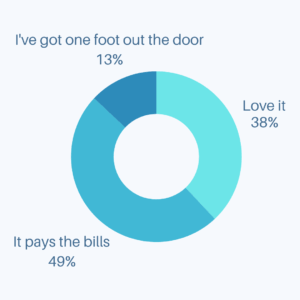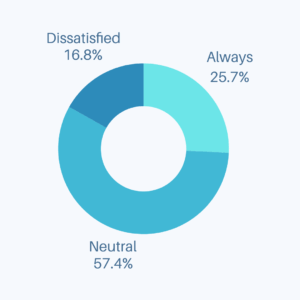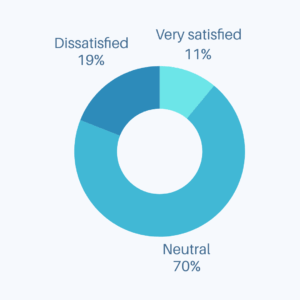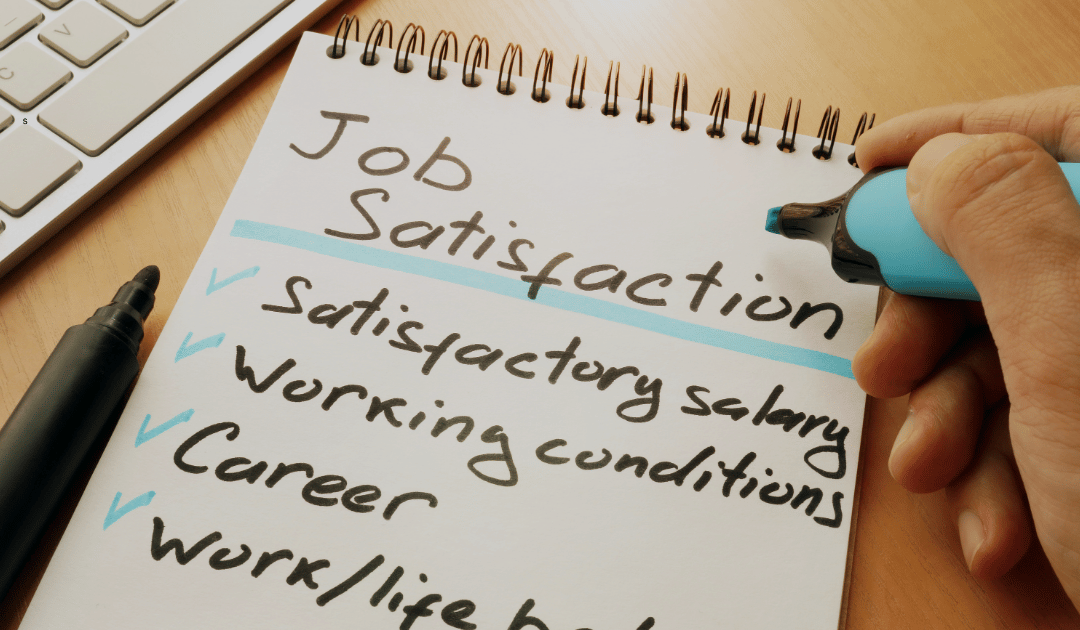How satisfied are restaurant employees?
Working conditions, management, compensation, work-life balance, and overall job satisfaction?
We surveyed 5,000 restaurant workers nationwide to gain insights into employee concerns and identify areas for change that could boost morale and retention.
Actively seeking feedback from restaurant employees about working conditions, management, compensation, and job satisfaction is essential for successful operations. These frontline team members experience the business from a unique perspective, and their insights can uncover inefficiencies, boost morale, and inform better decision-making.
Employees who feel heard are likelier to stay loyal, perform at higher levels, and contribute to a healthier workplace culture.
We asked the following questions:
- How satisfied are you with your current role?
- Do you feel your manager effectively communicates with you?
- Do you have the necessary tools and resources to perform your job well?
- Do you receive the support you need from your co-workers?
- Are you satisfied with your current pay and benefits?
- What could the restaurant you work at do to improve your overall work experience?
How satisfied are you with your current role?

Why is Employee Job Satisfaction Important?
When restaurant employees are happy, they demonstrate energy, care, and a professional attitude. Job satisfaction directly impacts service quality, team morale, and customer experience. Satisfied employees are also more likely to remain with the business long term, reducing costly turnover and fostering a stable, reliable team.
Why do you have one foot out the door?
Top three themes
- Poor Management and Work Environment: Inconsistent operations, low morale, inexperienced leadership, and negative experiences created a toxic or unstable workplace.
- Financial Instability: Not earning enough due to management taking tips and a sporadic work schedule, leading to ongoing stress about money.
- Desire for Change: Seeking new opportunities outside the current job.
Do you feel your manager effectively communicates with you?

Why Managers Must Communicate Well with Employees
Clear and consistent communication from managers sets the tone for trust, respect, and accountability in a restaurant. When managers communicate expectations, feedback, and updates effectively, employees feel more confident and connected to the team’s goals. Strong communication also prevents misunderstandings and helps resolve issues before they escalate.
What do you think needs to improve with the way your manager communicates?
Top three themes
- Greater Empathy and Engagement: Managers must genuinely care, show empathy, and be more active in their leadership roles.
- Better Listening and Trust: Employees want their managers to truly listen, understand their needs, and trust the team’s input.
- Address Work Culture Concerns: Improve communication around expectations and accountability to support stronger work ethics.
Do you have the necessary tools and resources to perform your job well?

Why It’s Important to Provide Employees with the Tools and Resources They Need
Equipping restaurant employees with the right tools, training, and resources empowers them to perform their jobs efficiently and confidently. These resources, from properly functioning kitchen equipment to clear operating procedures, directly impact performance and alleviate stress. A well-supported team operates more efficiently and delivers an enhanced guest experience.
What tools and resources need to be improved?
Top three themes
- Improved Communication: Better systems or practices for consistent, clear communication across the team.
- Adequate Supplies and Inventory: Ensure essential items like creams, jellies, and sanitation cleaners are stocked and available.
- Staffing and Advancement Opportunities: Address understaffing and provide more apparent promotion and career growth paths.
Are you satisfied with your current work schedule?

Why It’s Important to Provide Employees with a Schedule They Are Happy With
A fair, predictable schedule demonstrates to employees that their time and personal lives are valued. When restaurant staff have input about their availability and receive schedules that meet their needs, they are more likely to arrive at work motivated, avoid burnout, and remain loyal to the business. Offering flexibility and consistency helps in retaining employees.
What needs to improve with the work schedule?
Top three themes
- Consistency and Flexibility: Employees want more stable weekly hours with some flexibility based on personal needs.
- Support During Slow Periods: Slow periods lead to reduced shifts and income, with no backup plan or financial staff support.
- Improved Workload Distribution and Balance: Better enforcement of coworker accountability and attention to work-life balance are needed.
Do you receive the support you need from your co-workers?

Why Employees Need Good Support from Their Co-Workers
A collaborative and supportive team makes all the difference in a restaurant’s high-pressure environment. When employees assist one another, exchange knowledge, and step in when needed, it fosters a friendly atmosphere and alleviates stress. Strong peer support boosts morale, enhances service quality, and cultivates a resilient, high-performing team.
What needs to improve with the support you get from your co-workers?
Top three themes
- Accountability and Professionalism: Coworkers must handle pressure better and focus on work responsibilities.
- Improved Communication: Stronger, more effective communication among team members is needed.
- Basic Hygiene and Conduct: Some employees need to maintain better personal hygiene and workplace etiquette.
Are you satisfied with your current pay and benefits?

Why It’s Essential for Employees to Be Satisfied with Their Pay and Benefits
Fair pay and meaningful benefits signal to restaurant employees that their hard work is valued. When compensation aligns with the demands of the job and the cost of living, employees are more likely to feel respected and remain committed. Competitive wages and benefits also help attract top talent, reduce turnover, and foster a culture of trust and loyalty, establishing the foundation for a stable, motivated team.
What needs to improve with your current pay and benefits?
Top three themes
- Higher Pay Across the Board: Employees feel underpaid and want increased wages that reflect experience and responsibilities.
- Access to Benefits: Many employees report having no benefits and seeking comprehensive health and financial packages.
- Fairness and Transparency: Concerns about inequitable pay, especially for long-term staff compared to new hires, highlight a need for more transparent, fairer compensation practices.
What could the restaurant you work at do to improve your overall work experience?
Top five themes
- Improve Communication and Leadership Engagement: Employees want honest, consistent communication and managers who actively listen, lead by example, and engage with staff needs.
- Increase Pay and Offer Better Benefits: There’s a strong call for higher wages, fairer compensation structures, and access to comprehensive benefits packages.
- Staffing and Scheduling Improvements: Employees ask for more staff support (especially during busy times), more hours, set schedules, and better coordination (e.g., ensuring required items are available at shift start).
- Culture, Respect, and Recognition: Workers seek a workplace culture built on empathy, respect, appreciation, and an apparent effort to recognize and support dedicated team members.
- Operational Efficiency and Investment in Resources: To drive business and improve workflow, suggestions include upgrading equipment, improving organization, booking more events, adding cold storage, and expanding hours (like lunch service).


Recent Comments